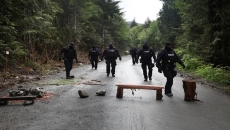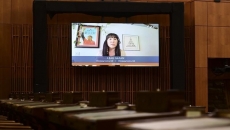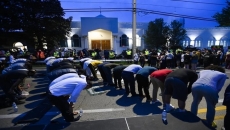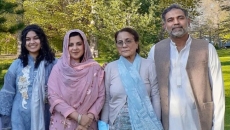Manitobans who get a COVID-19 vaccine could also get a six-figure cash injection in their wallets.
The provincial government is offering cash prizes of $100,000 and $25,000 scholarships in an effort to persuade more people to get a shot.
Anyone who has had or will receive a shot will be automatically entered into two lottery draws this summer. Each draw will have seven cash winners — three in Winnipeg and one in each of the four other health regions — and 10 scholarship winners. The scholarships will be reserved for youth between 12 and 17 years old.
"I'm not a big fan of gambling and that's why I think this draw makes such good sense," Premier Brian Pallister said Wednesday. "Because you're gambling with COVID if you're not getting a vaccination."
The faster we get vaccinated, the faster we get our lives back. Pleased to announce a new province-wide lottery that will award nearly $2 million in cash and scholarships this summer to Manitobans who get vaccinated. #ProtectMB https://t.co/S9RTmE9uA4 pic.twitter.com/kpTqitB8P0
— Brian Pallister (@BrianPallister) June 9, 2021
Vaccine uptake in Manitoba has been steady — two-thirds of people 12 and older have received at least one dose. But there are some spots where the rate is much lower, including the core area of Winnipeg and some rural regions south of the capital.
Health officials have said that while some people are hesitant about getting a vaccine, others may have barriers in terms of mobility or by being in marginalized groups.
Crown-owned Manitoba Liquor and Lotteries will be in charge of the draws slated for early August and September. Work is underway on details, including how Manitobans who received a dose outside the province can ensure they qualify, the government said.
The province asked for public feedback on the idea of incentives last week. Most respondents who were hesitant about getting a vaccine said they would not likely be swayed by cash payments, free admission to sporting events or draws for prizes.
Dr. Joss Reimer, medical lead of Manitoba's vaccination effort, said some prizes for getting doses could turn people off, but a lottery is different.
"We need to be very cautious when we use financial incentives because, for people who are already suspicious of the vaccine or of the government's intent, these financial incentives — if done in the wrong way — can make people more suspicious," Reimer said.
"The worst-case scenario is giving just straight up cash for doses. That's really when people start to feel that there's some sort of hidden message or reason that government wants them immunized other than their own benefit. But we didn't see the same effect when it came to a lottery. Lotteries tend to bring about more of a sense of celebration and excitement with people."
Pallister, who is to receive his second dose Thursday, won't be eligible for the lottery, which specifically exempts all provincial politicians.
The Opposition New Democrats questioned how the Progressive Conservative government found nearly $2 million for prizes at a time when hospitals are struggling to keep up with COVID-19 patients, some of whom have been sent to other provinces.
"Mr. Pallister has $2 million for this lottery, but where are the $2 million to help fix our (intensive care units) in our hospitals?" NDP Leader Wab Kinew asked.






